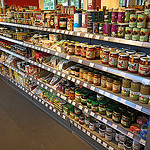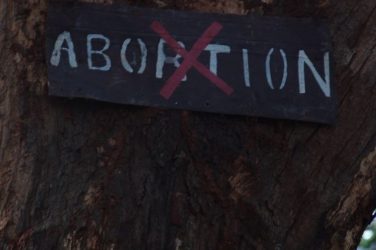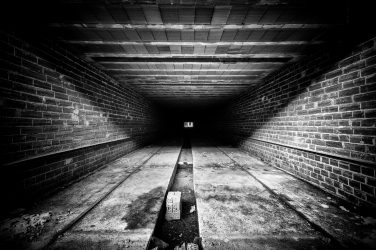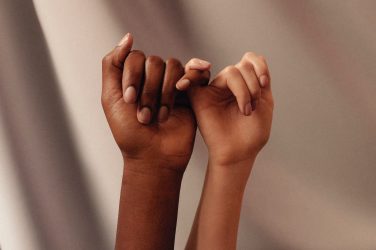These days, the legal right to gay marriage is viewed as a marker of a state’s progressiveness. But what about other members of the LGBTQ spectrum – particularly the T, for transgender? Living outside of heterosexual norms absolutely does not begin and end with marriage; there are the questions of finding yourself, getting comfortable with yourself and fighting each day for the right to exist as your authentic self. It’s time to break down the rigid walls that society has carved out for us.
Wiktor Dynarski, president of Trans-Fuzja – Poland’s first transgender non-governmental organisation – tells us about trans issues that are pertinent in Poland and other parts of Eastern Europe today, plus how things will hopefully look in the future.
E&M: Wiktor, thank you for talking to us. In activist circles, “safe space” means a place where the systemically oppressed are free to share their ideas and feelings, without judgement or backlash from oppressors. What do you think about safe spaces for trans people?
Wiktor Dynarski: I think when it comes to Poland, we can talk about different types of spaces. For me, an important question is whether non-governmental organisations are considered safe(r) spaces for trans people, but also whether general public spaces are friendlier to our communities. And, to be honest, that is one tricky issue. I think there’s great change happening within anarchist spaces like collectives, squats and other initiatives. These spaces have become extremely aware of systemic transphobia and day-to-day interactions that influence trans people’s realities. We see more and more queer trans-inclusive initiatives like festivals, lectures and workshops. Since these activities do not depend on funding, their work and the grassroots progress they make is possible thanks to the immense energy of everyone involved. And that is something I am really amazed by.
There are also a number of informal groups working on seminars on trans rights, trans issues, inclusive spaces and how to deal with transphobia. As a formal organization, Trans-Fuzja tries to support them with its formal status – which usually means that we are either a partner organisation in fundraising activities, or one of our team is participating in their activities. We do this both in Poland and when our partnership is needed abroad.
When it comes to other non-governmental organisations, I see more and more feminist spaces not only open to trans women (a topic that was a difficult one for many years), but also taking the initiative in fighting transphobia within its own movement. We also have had great experiences with migrant organisations and organisations working with people who either are or have been incarcerated. To our surprise, trans issues within these spaces are treated with respect and a bit of curiosity, but we no longer feel that people do not want to communicate about gender identity or gender expression. Within activist spaces the conversation has steered more into “Please tell me more, I want to understand” rather than “I don’t want to talk about it at all”.
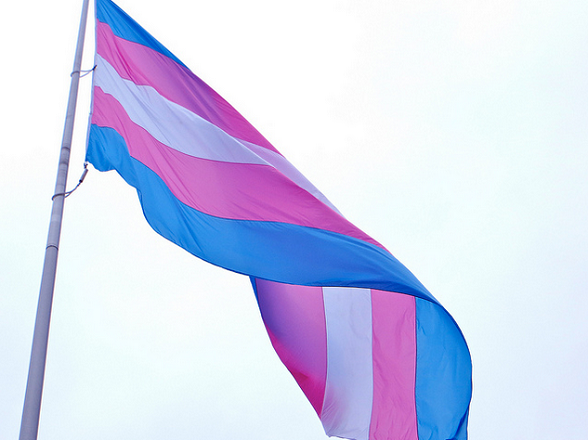
The international Transgender Pride Flag – the pink and blue represent traditional gendered colours,
while the white stripe in the middle represents intersex individuals.
E&M: There are different laws in certain parts of Europe affecting trans rights, like sterilisation for example. From this map, I noticed that Poland is the only Eastern European country not to have this policy. I was curious about why this might be; is there an Iron Curtain of trans rights still? Is it a phenomenon for trans people to come from, say, Ukraine and feel safer in Poland?
WD: When it comes to sterilisation, the reason why it’s like that is purely because sterilisation itself is illegal and punishable by law, even when voluntary. Trans people can undergo sterilisation procedures only after being legally recognised in their desired legal gender. On one hand, this is for the benefit of the trans community, on the other since the legal process can take quite long (as it is an extremely complicated process, I will refer you to two articles I wrote on the matter here and here), it actually prohibits a lot of trans people from achieving their desired gender reassignment goals. This is because most surgeries have to wait before a new gender marker is acquired. An ideal situation for Poland would be a law where medical interventions (including hormonal therapy) are not forced, but are also available before legal recognition of one’s gender. The aspect of choice and being able to decide about one’s body are crucial for this movement in relation to human rights, which is why I am also quite happy that we are finally able to form alliances with the feminist movement – we have actually a lot in common with the aspect of choice and bodily autonomy.
The subject of Ukraine and other Eastern European countries is an interesting one. I cannot say that there are many trans people coming to Poland to feel safer. So far we have actually had three trans persons whom we have helped; two of them being refugees from Belarus, and one person from Ukraine. We actually don’t see that many people coming from Ukraine, but that may be due to the fact that they simply do not know about our existence or do not feel that our services are right for them. Another reason may be that although the situation of trans people in Ukraine is very difficult, there is a quite strong and dedicated movement that is able to help with different issues and cases. And finally, there’s that difficult place where Poland is currently – I’m not sure whether people who want to find a safe place to live would actually choose Poland to be their final destination. On the contrary, I think Poland can serve for most people as a short stop between travels and a first step in the Schengen area. I know that quite a few people ask for asylum here, based on their gender identity and trans status. As I mentioned, we are a great first step to take in Europe.

E&M: You’re the president of the Trans-Fuzja Foundation. Could you explain to us what it’s all about?
WD: Trans-Fuzja Foundation is a Polish organisation established in 2008 with an aim to support trans people in Poland. Within a few years we moved from a support-only approach, to a politically engaged organisation with specific goals concerning the legal, social, economical and human rights situation of transgender people. After a few years of functioning, Trans-Fuzja became a recognisable expert organisation working on (trans)gender-specific issues.
Trans-Fuzja’s vision is the absolute respect of transgender human rights in Poland, social equality for trans people and lack of discrimination in any area of life, especially regarding gender identity and gender expression. We define our mission as follows:
- bettering the quality of life of trans people in Poland by offering support services and broadening the knowledge of medical experts, journalists, psychologists and lawyers on gender identity, gender expression and transgender issues;
- adapting gender recognition procedures to the “Argentinian model” (ensuring a person’s autonomy in decision regarding medical aspects of transition);
- encouraging transgender people’s active participation in various areas, especially regarding culture and recreation.
We have quite a few strategic areas of work, and I can name many examples of what we do within those areas. Some of these areas are advocacy (updating anti-discrimination acts, working on gender recognition proposals), support (providing peer counselling, running an intervention shelter for victims of violence), education (offering training to medical experts, police and psychologists), healthcare (access to healthcare specific to transgender concerns), culture and recreation (promotion of transgender artists and authors, tackling the topic of transgender inclusion in sports) and international work (representation in NGO structures, creating resources in English).
Within activist spaces the conversation has steered more into “Please tell me more, I want to understand” than “I don’t want to talk about it at all”.
E&M: How has Poland’s history/journey of gender acceptance been so far?
WD: I don’t know if we can actually speak in terms such as “journey of acceptance” or history of it, but I can definitely say, trans issues have a lot more visibility today than they had a few years prior. And trans people, for that matter. Large cities have become friendlier (I don’t know if I can use the word “safer” but “friendlier”, yes) and coming out as trans is becoming easier, especially if one is able to surround themself with understanding peers.
I think Anna Grodzka’s parliamentary career contributed a lot to trans visibility. She’s a proud trans woman who is open to talk about her experiences and for whom being a member of parliament has been a journey of confronting transphobia and stereotypes. With all the things that she’s endured, I have to say, I’ve grown to respect her even more than I already did. I won’t lie: we have been friends for a number of years now and I have always looked up to her. She is a strong and powerful woman who takes pride in who she is and what she thinks is right. She taught me a lot about myself and does so every time we meet. It’s amazing that this kind of person had a possibility to influence Polish politics!
There is also another trans woman whom I would like to mention when it comes to visibility – Ewa Hołuszko, who used to be a freedom fighter during socialism and who lost most of her political friends because of the fact that she transitioned. She even received a medal for her work from the late Lech Kaczyński, former president of Poland (a great moment in trans history, no doubt!). But, unfortunately, that didn’t change the fact that she did not find her place among others who were fighting beside her in the struggle for a democratic Poland. Her story actually shows that sometimes the choice of being yourself comes with a lot of sacrifice. And that should not be the case.
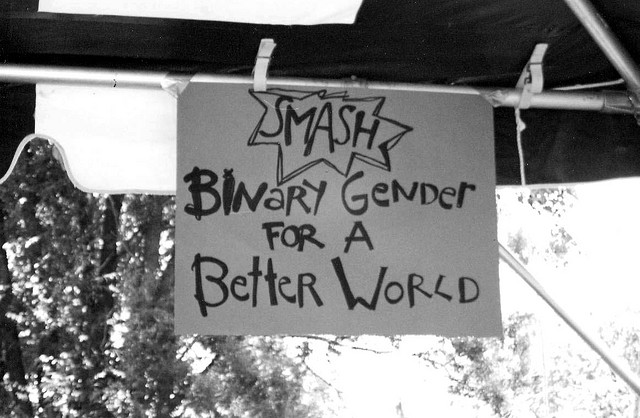
Sadly, there is still a lot of violence in Poland, both verbal and physical, on the streets and in homes. Trans youth are still unable to thrive the way they should and we still see parents contacting us to help them “change” their child so that they won’t be trans. But on the other hand, more and more parents are actually very supportive and we also see school environments changing. We are currently running a small research project and one of our activities in it are interviews with headmasters of schools who have been accepting of their students’ social transitions. And it is amazing to see those educators so dedicated to creating a safe and accepting environment even the law isn’t that clear on this particular issue. This actually gives me hope, that a lot is possible when one puts their mind into it and realise that we need to understand each other to be an accepting society. But, like I said, it’s impossible to tell, whether this goes for the whole country – there are good things happening and there are also bad things happening and we cannot tell if everything is steering up to get better. There’s a lot of right-wing extremism on the rise in our region and we are concerned about it, actually we talk a lot about it inside our organisation, since it is a subject that needs to be addressed and not forgotten. With visibility on the rise, we cannot take our minds away from what’s important.
E&M: Has your experience as a trans individual in other countries been different to your experience in Poland?
WD: Well, that depends, whether we’re talking just visiting or living somewhere. So far I have lived in Poland and in Slovakia and I have to say both experiences are and were difficult. In Slovakia I felt a stronger social pressure to fit in when it comes to gender expression. I experienced a lot more outspoken homophobia and transphobia and felt as if I was constantly monitored with just being myself. I do not get as much of it in Poland, it doesn’t mean, however, that I am relaxed with my expression or my general safety. I’m a non-binary person and I like to show it with some aspects of my expression, but I’m not always comfortable to do that in Warsaw, which is part of what I know can happen but also part of my own process and the need to feel safe. In other words – if there’s the potential of not being safe, I keep my expression to a more masculine spectrum. I’m not happy about that exactly, but that is why I like and keep travelling to different places to experience a space where I can actually be OK with my own expression. I go to conferences, meetings and trans-inclusive events to meet my peers, to enjoy their company and to feel that our community stands strong in solidarity. I think that gives me the most power.
E&M: American trans woman Janet Mock said: “The misconception of equating ease of life with ‘passing’ must be dismantled in our culture.” In this context, “passing” means a trans person blending in as a cis person. What do you think about this quote and about passing in general?
WD: Passing is a difficult concept and there are many ways to tackle it. First of all, it gives closure. To pass means “to fit well enough to be considered a part of a certain group”, which in many aspects is what being trans is all about to some members of our community. To do everything you need to do to be treated and feel like one of the members of a cisgender society. And, unfortunately, it can backfire as we see transphobia within our own communities, a lack of understanding of different expressions and sometimes also a hostile attitude to those who do not pass or who do not wish to go the “traditional transsexual way” (or “true transsexual way”). Talking about various aspects of being trans opens us up to criticism coming from different angles.
If the price of passing is subscribing to the policing of other people’s bodies, I’m not buying it.
As a person, I wish we were beyond the concept of passing, I wish it was more important to be ok with our own expressions regardless of how it places itself within a society and its “frame of acceptance”. But at the same time, I really understand why it is so important to pass and to know that you belong. If you have always felt like an outcast and you have finally arrived to the point where you’re ok with yourself and others accept you as you, why wouldn’t you like it? But the fact is – if there’s a place where you are comfortable, it means that this place is uncomfortable to someone else. To me, a gesture of solidarity is when someone who passes makes others realise that not passing, or not buying the whole concept altogether is absolutely okay.
If the price of passing is subscribing to the policing other people’s bodies, I’m not buying it.
E&M: You recently attended the Trans*Festival in Krakow. Did you learn or discover anything particular there that you’d like to share?
WD: I think the Trans*Festival was a great experience. It was the first trans arts event in Poland and it had a great focus on diversity, networking, international experiences and addressing issues Poland is still not comfortable with such as racism, ableism and ageism. And all of this within a trans spectrum!
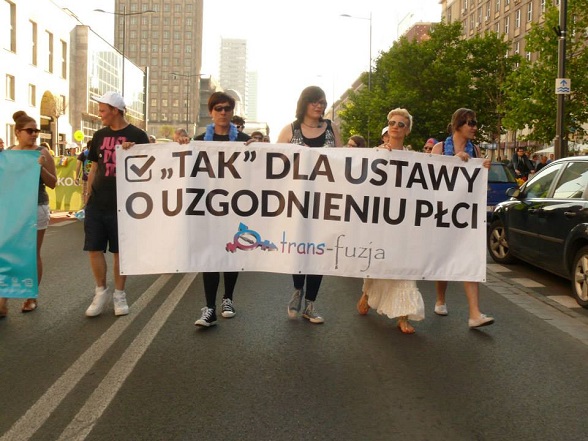
Warsaw Pride, 13 June 2015: “Say yes to the law on gender recognition”
What I’d like to share is a large thank you to the organisers for making this happen. I know it wasn’t easy to put the whole event together, I also know it’s never easy to be as inclusive, as planned and even though there were difficulties on the way (there was a huge issue with one of the exhibitions where one of the photos used blackface as a technique to portray stereotypes of black people and for a number of participants of the festival – myself included – this technique was not acceptable within such a space), the organisers were able to address them and to manage an absolutely diverse and demanding group.
Personally, Trans*Festival also means one additional thing to me: that Polish activism is growing amazingly rapidly, that trans issues are no longer only Trans-Fuzja’s concern and that other organisations and initiatives can do it as well, which is a really big deal. We created this organisation in 2008 exactly because no one knew how to work with trans people and what to do about trans issues. And only seven years later, we have dozens of trans-inclusive and even trans-only initiatives! I am amazed by how our community has grown and cannot wait to see what happens next. I do hope we go a lot more political than we did so far. Especially with the threat of right-wing agenda coming back to haunt us. There’s a lot of potential in us, but I think that it is still to be realised by trans people in Poland. I hope we’re not far from that.
About the Interviewee
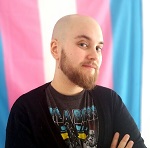 Wiktor Dynarski is a PhD student at Warsaw University Institute of Applied Sciences, a trans activist within Poland and Central Eastern Europe, president of the Trans-Fuzja Foundation (Poland’s first trans NGO) and Chair of the Control Committee at TransFúzia (Slovakia’s first trans association).
Wiktor Dynarski is a PhD student at Warsaw University Institute of Applied Sciences, a trans activist within Poland and Central Eastern Europe, president of the Trans-Fuzja Foundation (Poland’s first trans NGO) and Chair of the Control Committee at TransFúzia (Slovakia’s first trans association).
Wiktor works as a freelance trainer and lecturer on trans issues, human rights, trans Polish history and internal NGO management.
Cover photo: Transguyjay(Flickr); Licence: CC BY-NC 2.0 *Image cropped by E&M


